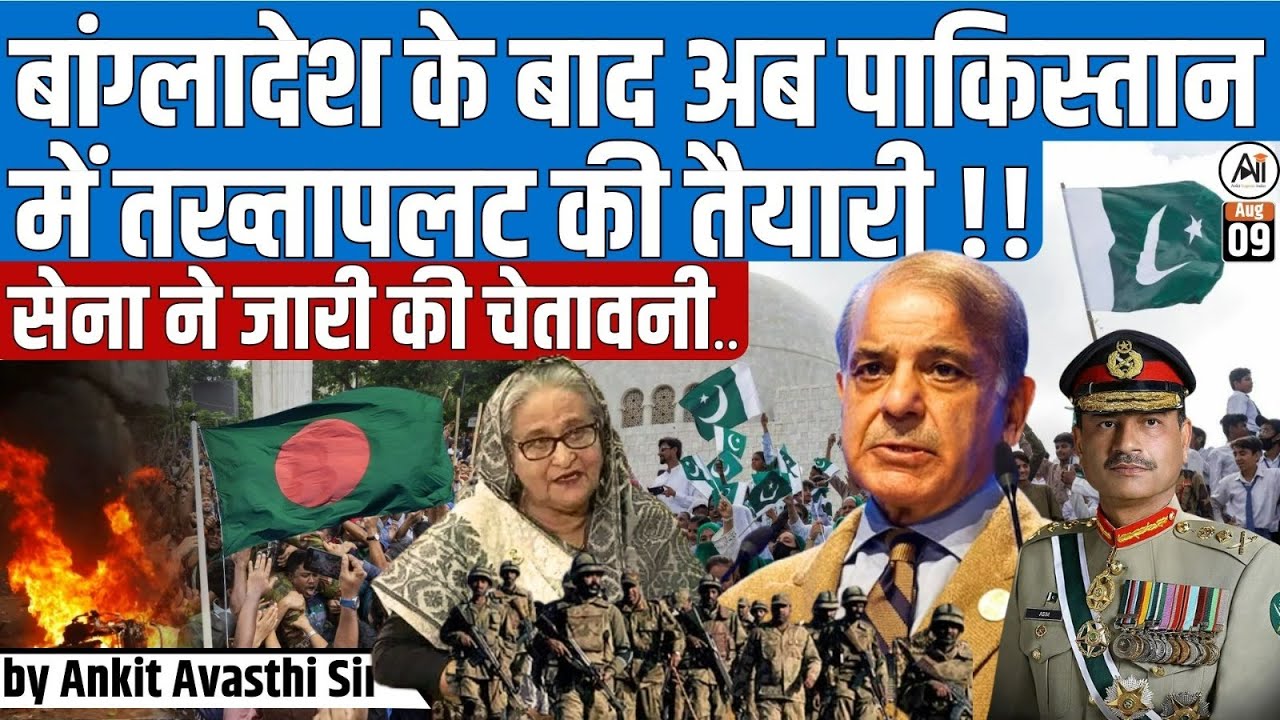PM Modi needs to take Bangladesh seriously, here’s why | Abhi and Niyu
Summary
TLDRThe video script discusses the evolving political dynamics in Bangladesh, comparing it to Pakistan. It highlights concerns about rising religious extremism, military influence, and anti-India sentiments in Bangladesh, paralleling Pakistan's trajectory. The script warns about the potential implications for India's security, particularly concerning the strategic 'Chicken's Neck' corridor. The video also touches on the possible role of China in future tensions. Additionally, it covers a promotional segment for an AI masterclass offered by Growth School, encouraging viewers to learn new skills to stay competitive in the AI-driven world.
Takeaways
- 😟 Bangladesh may be moving towards a path similar to Pakistan, with increasing religious extremism, military interference, and anti-India policies.
- 🇧🇩 Bangladesh's national anthem, written by Rabindranath Tagore, is facing criticism, with some citizens claiming it was imposed by India.
- 🔫 Bangladesh has recently requested ammunition from Pakistan, raising concerns about its defense alignment and future geopolitical strategies.
- 📉 The political instability in Bangladesh, including the vandalization of Sheikh Mujibur Rahman statues, mirrors past conditions in Pakistan that led to military rule.
- 🗡️ Extremist individuals like Jashimuddin Rahmani, with connections to terrorist organizations, are being released in Bangladesh, posing a potential security threat to India.
- ⚖️ Nobel laureate Muhammad Yunus is seen as a caretaker of Bangladesh, promising it won’t become another Afghanistan, but the nation’s future remains uncertain.
- 📜 Some groups in Bangladesh are pushing for constitutional changes to align more with Islamic law, similar to Pakistan’s objectives resolution from 1949.
- 🇮🇳 Anti-India sentiment is on the rise in Bangladesh, with movements to break ties with India even if it means forsaking their Bengali identity.
- 🚧 The Siliguri Corridor (India’s chicken's neck) could become a strategic risk for India, should Bangladesh lean towards China or Pakistan.
- ⚠️ Indian leaders have warned about a potential 2.5 front war, with Bangladesh's instability possibly adding to India’s security challenges from Pakistan and China.
Q & A
What is the main concern raised in the video regarding Bangladesh?
-The main concern is that Bangladesh may follow Pakistan's path, showing signs of religious extremism, weak leadership, military interference, and an increasing anti-India sentiment.
How does the video describe the relationship between Bangladesh and Pakistan historically?
-Historically, Bangladesh and Pakistan had different paths after their split in 1971. Bangladesh's economy prospered, while Pakistan lagged behind. However, the video suggests that Bangladesh is now developing similar traits to Pakistan.
What is the significance of Bangladesh's national anthem in the video?
-The video mentions that Bangladesh's national anthem, 'Amar Shonar Bangla,' written by Rabindranath Tagore, is being rejected by some who claim India imposed it, reflecting growing anti-India sentiment.
Who is Jashimuddin Rahmani, and why is his release a concern?
-Jashimuddin Rahmani is the head of the Ansarullah Bangla Team, linked to Al-Qaeda. His release from jail is concerning because of his support for creating instability in India and his violent, extremist views.
What is the '2.5 front war' mentioned in the video?
-The '2.5 front war' refers to India potentially facing conflicts on two fronts: Pakistan and China, while also dealing with internal instability possibly fueled by external actors like Bangladesh.
Why is the 'Chicken's Neck' corridor important for India?
-The 'Chicken's Neck' is a narrow 22 km corridor that connects India's Northeast with the rest of the country. If blocked by Bangladesh or Nepal, it could disrupt India's access to the Northeast and pose a strategic threat.
What warning does the video offer about military rule in Bangladesh?
-The video warns that Bangladesh could see military rule, similar to Pakistan, if the government fails to maintain stability, especially following student protests and rising religious extremism.
Why is the video concerned about anti-India sentiment in Bangladesh?
-Anti-India sentiment in Bangladesh could harm diplomatic and economic relations and may push Bangladesh closer to countries like China or hostile policies, impacting India's security.
What role does the video claim religion plays in Bangladesh's political instability?
-The video claims that religious extremism, with a focus on Islamic laws and anti-secular movements, is rising in Bangladesh, leading to political instability and a potential shift toward an Islamic state.
What potential impact could Bangladesh's current political trajectory have on India?
-Bangladesh's shift towards extremism and growing hostility towards India could destabilize the region, increase security threats, and disrupt economic ties, especially if Bangladesh aligns with China's interests.
Outlines

This section is available to paid users only. Please upgrade to access this part.
Upgrade NowMindmap

This section is available to paid users only. Please upgrade to access this part.
Upgrade NowKeywords

This section is available to paid users only. Please upgrade to access this part.
Upgrade NowHighlights

This section is available to paid users only. Please upgrade to access this part.
Upgrade NowTranscripts

This section is available to paid users only. Please upgrade to access this part.
Upgrade NowBrowse More Related Video

बांग्लादेश के बाद अब पाकिस्तान में तख्तापलट की तैयारी! सेना ने जारी की चेतावनी..by Ankit Avasthi Sir

Pakistan to Deliver First Batch of Anti-Tank Guided Missiles to Bangladesh | InShort

Bangladesh crisis: What are the implications for India and what happens next? | IR | UPSC

Pakistan Army Returning to Bangladesh After 1971 Defeat? | Vantage with Palki Sharma

Islamic Bloc Opens Front Against India, War Inevitable? | The Chanakya Dialogues Major Gaurav Arya |

NCERT Class 12 Political Science World Politics Chapter 5: Contemporary South Asia | CBSE | English
5.0 / 5 (0 votes)